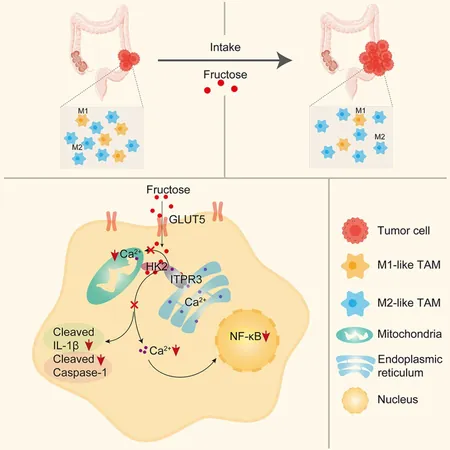
12 Groundbreaking Innovations in Cancer Treatment: A Game-Changer for Early Detection and Therapy
2024-11-20
Author: Ming
The battle against cancer has gained momentum with the recent announcement from the World Economic Forum (WEF), unveiling 12 revolutionary advancements poised to reshape clinical diagnostics and treatment. As cancer remains a leading global cause of death, claiming around 10 million lives each year according to the World Health Organization (WHO), these breakthroughs offer renewed hope for early detection and improved patient outcomes.
The WEF's updated list highlights targeted innovations particularly relevant for pathologists and clinical laboratory leaders, focusing on four key advancements.
1. Personalized Cancer Vaccines: A Tailored Approach to Treatment
The National Health Service (NHS) in England is at the forefront of developing personalized cancer vaccines through a partnership with BioNTech, renowned for its role in the COVID-19 vaccine. This initiative, called the NHS Cancer Vaccine Launch Pad, aims to match patients with clinical trials that utilize messenger RNA (mRNA) technology. These vaccines will be tailored to the unique mutations present in each patient's tumor, offering a customized treatment option that enhances the immune response against the specific cancer cells.
2. Swift and Efficient Cancer Treatment Injection
In a significant shift towards more efficient cancer care, NHS England has introduced a seven-minute under-the-skin injection of atezolizumab, an immunotherapy drug marketed as Tecentriq. Traditionally, this treatment required a lengthy intravenous administration, consuming 30 to 60 minutes. The new injection method not only saves valuable time for cancer patients but also streamlines processes for healthcare teams, all while stimulating the immune system to combat various cancers, including breast and lung.
3. Harnessing AI for Enhanced Cancer Screening
Artificial Intelligence (AI) is making waves in cancer diagnostics, particularly in India where the Center for the Fourth Industrial Revolution (C4IR) is spearheading initiatives to utilize AI for cancer risk profiling. By developing tools that can analyze common cancers, like breast cancer, these efforts aim to facilitate early diagnosis which is crucial given that many cancers are asymptomatic in their early stages.
Additionally, researchers at MIT have created an innovative AI model called Sybil that analyzes low-dose CT scans for predicting six-year lung cancer risks without human intervention. This technology has shown promising validation results, significantly enhancing early detection capabilities.
4. Genomics: Uncovering Cancer's Hidden Causes
A groundbreaking study from the University of Cambridge, using data from the 100,000 Genomes Project, has unveiled a wealth of information regarding cancer-causing mutations. By sequencing the genomes of 12,000 cancer patients, researchers identified patterns linked to environmental triggers and discovered 58 new mutational signatures, suggesting the existence of unexplored cancer causes. This advancement opens new avenues for understanding individual cancer risks and potential preventive measures.
5. Validation and Caution in CAR-T Cell Therapy
CAR-T cell therapy, while promising in its ability to modify patients' immune cells to attack cancer, is currently under scrutiny by the FDA due to reports of severe complications. Though early results were incredibly encouraging, the treatment's association with potential malignancies underscores the need for continued research and patient monitoring.
6. Repurposing Existing Drugs for Prevention
In a remarkable proactive step, the NHS plans to make anastrozole, a drug traditionally used for treating breast cancer in post-menopausal women, available for preventive use among those at high risk. This initiative could lead to the prevention of 2,000 breast cancer cases annually, showcasing the potential of repurposed medications in cancer prevention strategies.
7. Breakthroughs in Cervical Cancer Treatment
Recent results from a major clinical trial indicate a novel treatment for cervical cancer that combines established therapies. This approach has been found to reduce the risk of death by 40% and relapse by 36%, marking the most significant advancement in the treatment of cervical cancer in decades.
With these pivotal advancements highlighted by the WEF, the landscape for cancer diagnostics and treatment is rapidly evolving. Continuous monitoring of these innovations can lead to life-saving transformations in how cancer is detected and managed, offering hope to millions affected by this devastating disease.
Stay tuned for more updates on these revolutionary medical advancements that are set to change the future of cancer care!



 Brasil (PT)
Brasil (PT)
 Canada (EN)
Canada (EN)
 Chile (ES)
Chile (ES)
 España (ES)
España (ES)
 France (FR)
France (FR)
 Hong Kong (EN)
Hong Kong (EN)
 Italia (IT)
Italia (IT)
 日本 (JA)
日本 (JA)
 Magyarország (HU)
Magyarország (HU)
 Norge (NO)
Norge (NO)
 Polska (PL)
Polska (PL)
 Schweiz (DE)
Schweiz (DE)
 Singapore (EN)
Singapore (EN)
 Sverige (SV)
Sverige (SV)
 Suomi (FI)
Suomi (FI)
 Türkiye (TR)
Türkiye (TR)